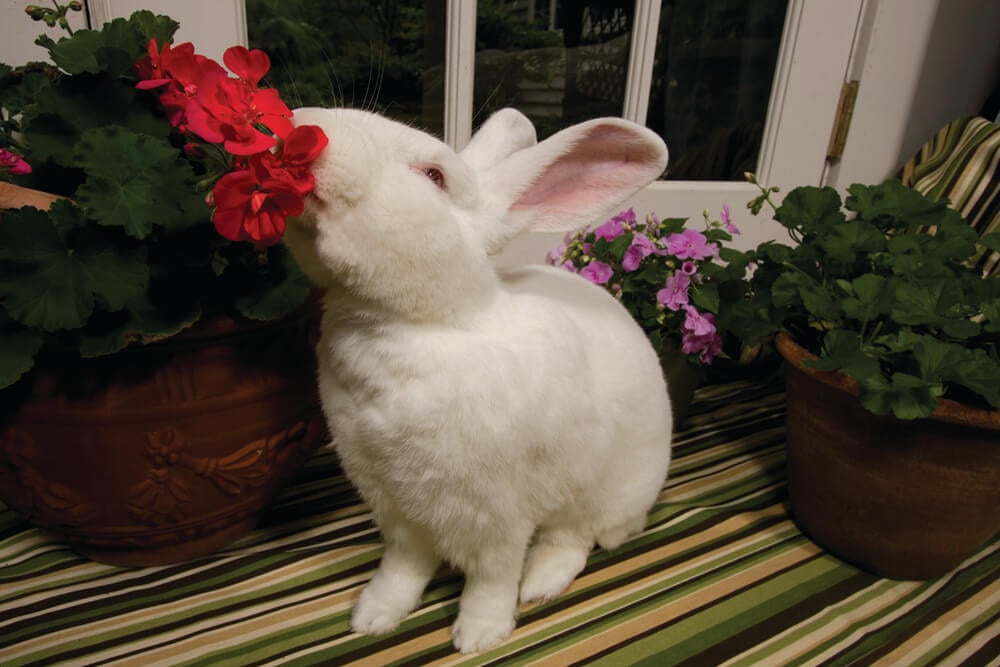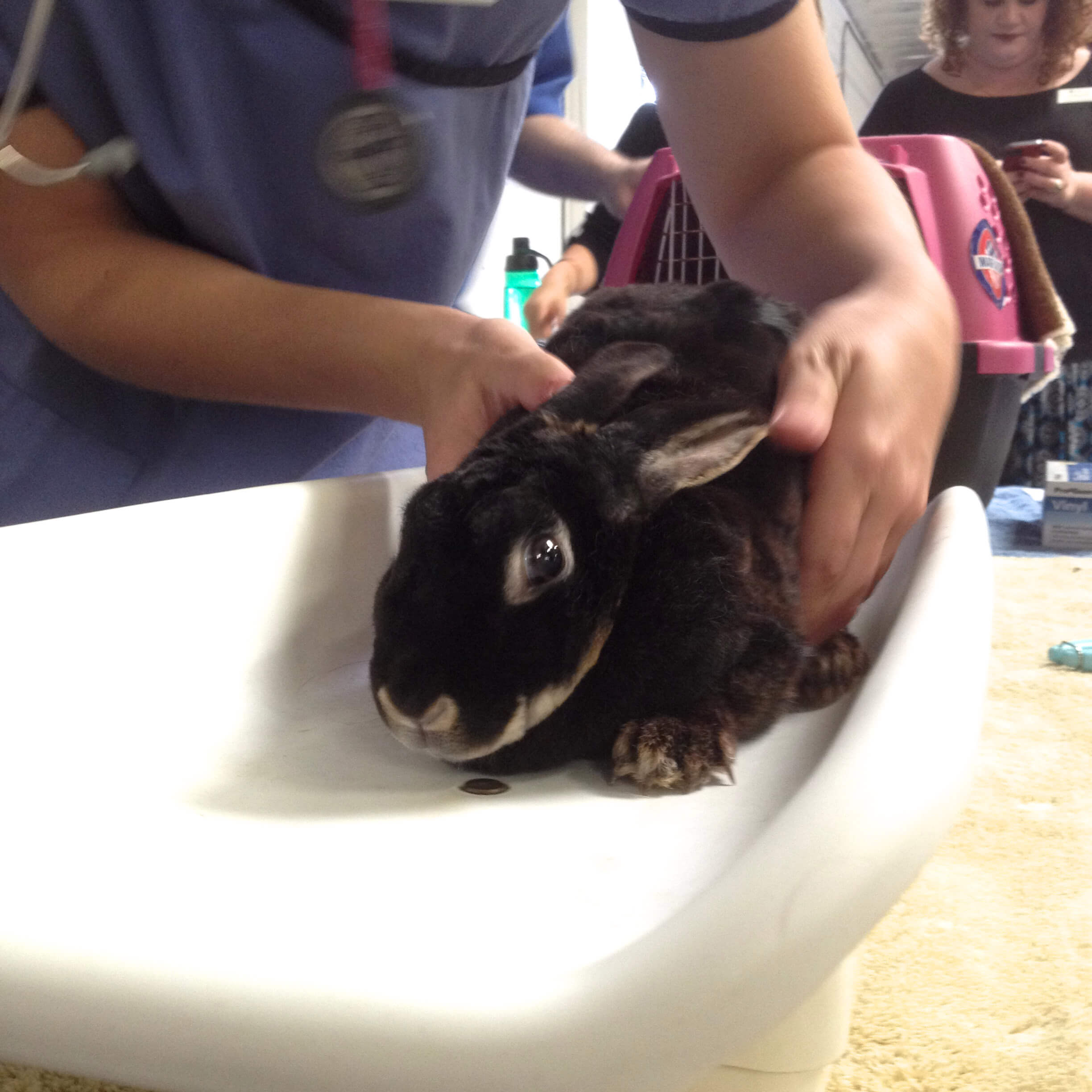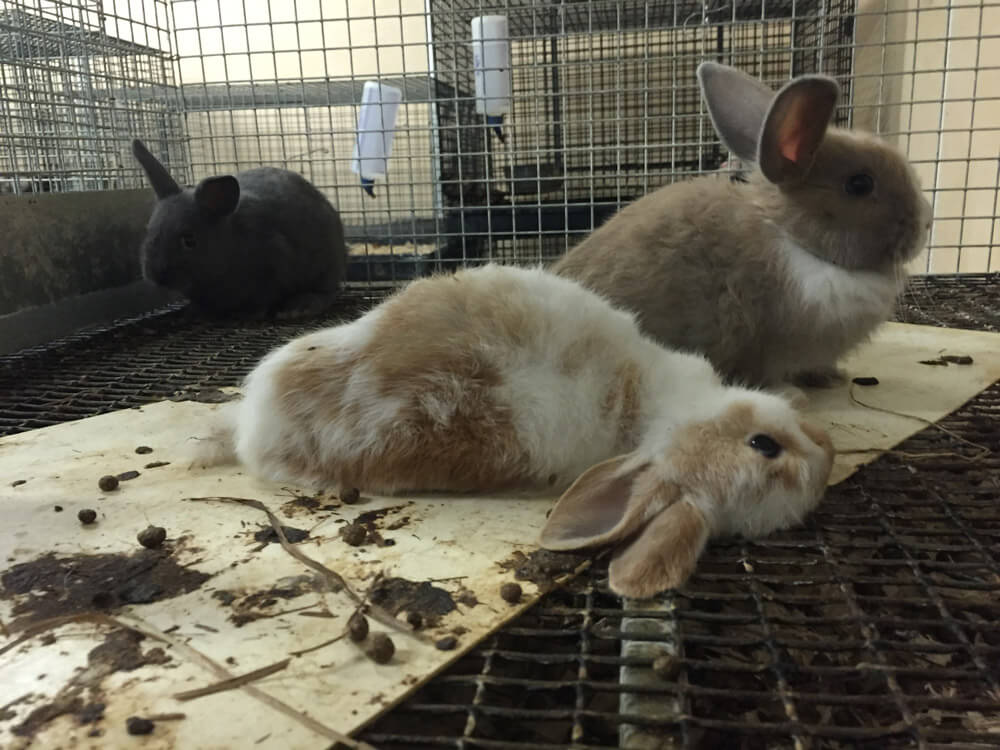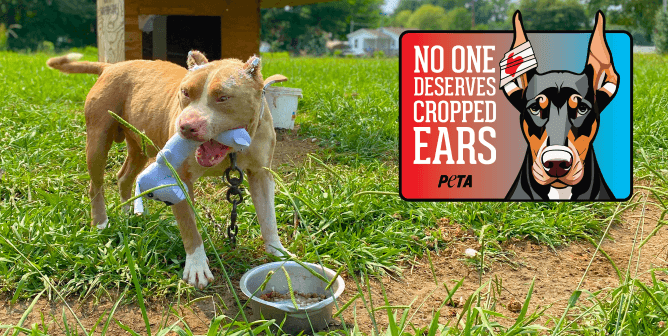Every spring, breeders and bunny mills churn out cute little baby rabbits for parents to put in their children’s Easter baskets. Then, during the ensuing weeks, animal shelters are inundated with these same rabbits after they wear out their welcome in their new homes. In fact, rabbits are the third most surrendered animal at shelters (just behind dogs and cats). When animals chew through electrical wires, books, baseboards, doorjambs, or Easter lilies, reality sets in that caring for a rabbit can be a lot of work. Are you thinking you might want to buy a bunny? There’s a good chance you have no idea what you’re in for.

Here are 10 good reasons not to buy a rabbit this Easter (or ever):
1. Rabbits aren’t “starter pets”—they’re high-maintenance, long-term commitments.
While healthy adult rabbits will typically use a litterbox to do their business, they do a lot of business—and you will have to keep their box clean by changing it at least every other day. This is not an exaggeration. On top of that, maintaining your rabbit’s living area means vacuuming just about every single day.
Rabbits need a daily supply of timothy hay to maintain their teeth (which never stop growing). Providing a steady stream of bedding, hay, fresh produce, and pellets can be expensive. Are you ready to turn over your living room to your lagomorph loved one? (Lagomorphs are an order of mammals including rabbits, hares, and pikas.) Rabbits like to interact with their human families, and they become depressed if kept in a cage or isolated in, say, a laundry room.
Rabbits require lots of mental stimulation and exercise—they need just as much attention as a cat or a dog. They crave affection and playtime.
2. If you keep them outside, they’ll die much sooner.
Happy rabbits who live indoors and are properly cared for can live for 12 years or more. When left outside in hutches, they can suffer in extreme heat or cold, rain, or snow. Rabbits kept out of sight are often forgotten about and neglected. They can become infested with parasites such as mites, fleas, and intestinal worms. Their accumulated waste attracts flies, which can lead to flystrike (i.e., being eaten alive by maggots). They can even die of fright if they spot a hungry hawk overhead or if the neighbor’s dog gets into the yard. Without clean water, regular healthy meals, and socialization with humans or other animals, your rabbit’s life will be miserable.
3. Rabbits will try to destroy your home.
Rabbit guardians can attest that these rambunctious animals will chew the paint off your walls, eat cell-phone chargers, nibble holes into your flip-flops, destroy your PlayStation controllers, and chomp right through your vacuum cord. They sometimes get electrocuted. Breeders and pet stores often fail to mention that rabbits chew incessantly (their teeth never stop growing), so they need constant supervision and bunny-safe chew treats and toys.
4. Rabbits shed everywhere.
Imagine that you invited some friends over for dinner and one of them is allergic to rabbits and can’t stop sneezing. Or you put on a nice outfit to hit the town, only to realize your clothing has become covered with rabbit hair. This is the reality of living with a bunny. In addition, you have to brush your rabbit all the time, because, unlike cats, rabbits cannot cough up hairballs, which can be fatal to them.
5. Handling your rabbit could leave you with bloody welts.
Rabbits can look irresistibly cute (especially when they clean their ears), but they prefer to have both feet on the ground, and if you pick them up, they may try to escape by jumping out of your arms—but not without scratching you up first. The resulting fall can be a big deal for small animals, whose bones can become dislocated or broken by the impact. Your rabbit’s nails will need regular trimming, which can be painful if done improperly or too infrequently. You can have a vet do it, but this service isn’t free.
6. Rabbits can easily get sick.
Bunnies are very sensitive, so even small changes or improper foods can make them sick or even kill them. Signs of a sick bunny include a runny nose, tilting their head to the side, lethargy, diarrhea, sneezing, lack of appetite, teeth grinding, drooling, and constipation. If rabbits have sores or scabs on their bodies, it could mean that they have fleas or mites. Bunnies can die very quickly if they get sick, so they must be taken to a veterinarian right away. It can be difficult to find one that will treat rabbits, and treatment can be expensive, on top of spaying and neutering (to prevent disease), which adds more bucks to the bunny’s (fluffy) bottom line.

7. Pet store suppliers abuse rabbits and keep them in horrific conditions.
Perhaps one of the most important reasons never to buy a bunny is that doing so fuels the egregiously cruel pet trade. A PETA investigator went inside a facility called Holmes Farm that supplied Petco and PetSmart and never saw any animals receive veterinary care, despite repeatedly alerting the manager to sick and injured animals. Workers piled dozens of animals—including rats, gerbils, guinea pigs, and a rabbit—into a feces-smeared cooler and crudely gassed them with carbon dioxide. Their screams could be heard across the room.
Workers didn’t check the animals for signs of life before dumping their bodies into a trash can or sealing them in plastic bags to sell as “feeders.” Some sick or emaciated animals languished for days without care, including rabbits who eventually died in cages. Some of them had less than a square foot of “living” space.

When Petco, PetSmart, and other stores returned sick, injured, or unwanted animals to Holmes Farm, they often went for days without water.
PETA’s eyewitness was able to rescue a rabbit named Leela, who suffered from an apparent upper respiratory infection for 10 days without treatment and whose left eye was sealed shut with discharge. After visiting the vet and being treated with antibiotics, she beat the infection and was placed in a proper home.
Never ever buy a rabbit (or any other animal) from a pet store or anywhere else. If you’re equipped to care for a rabbit properly, adopt from a reputable shelter.
8. Rabbits get lonely. Are you prepared to care for two of them?
Rabbits are much happier and healthier living with compatible bunnies they can play and snuggle with. But pet stores and breeders have no qualms about selling baby rabbits in singles—making for some very lonely little bunnies.
While rabbits are naturally social animals, they can also be territorial, and getting them to bond can be a long process—and even result in fighting and injuries if a guardian isn’t careful. Rabbits should always be spayed or neutered before they’re introduced to each other during short, supervised bonding sessions. These sessions should be in neutral territory and become progressively longer. The bunnies will need to be housed separately (ideally, within sight of each other) until it’s clear that they’ve formed a peaceful friendship. Rabbits usually show this by relaxing side by side and grooming each other. At this point, they can move in together.
9. Many people who buy rabbits end up regretting it, but it’s the animals who end up suffering.
Once the novelty wears off, bunnies are often dropped off at an animal shelter, relegated to a cage outside, or simply turned loose—even though they don’t stand a chance against harsh weather conditions, injuries, diseases, parasite infestations, or predators. Shelters and rabbit rescues are bursting at the seams with unwanted bunnies acquired hastily by people who didn’t realize that caring for a bunny requires a lot of time, money, and effort.
10. Breeders worsen the homeless-animal crisis.
An animal purchased at a pet store or from a breeder will be replaced by another one, perpetuating the cycle of abuse and taking homes from bunnies who are already in shelters awaiting adoption. Responsible rabbit guardians have their bunnies spayed or neutered to prevent reproductive diseases and to stop them from breeding.
*****
Bunnies are individuals whose personalities and interests vary greatly. Some rabbits love cuddling with their guardians and will lick your face, beg for food while you eat, and become so excited to see you that they’ll binky. Other bunnies are more reserved or prefer the company of other animals.
If you feel that you’re ready to welcome two bonded rabbits into your family and provide them with a fulfilling life in a calm, quiet household, please visit your local shelter or rabbit rescue group. Never ever buy a rabbit.
You can also help rabbits by refusing to buy products that are tested on animals. Rabbits are exploited in laboratories for cosmetics, household cleaners, and other product tests. These may involve poisoning rabbits, smearing harsh chemicals on their bare skin, or dripping corrosive chemicals into their eyes. If you care about rabbits, be sure to buy only cruelty-free products.





